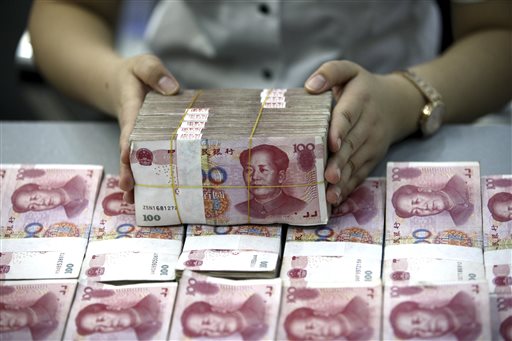Shares languish despite China rate cut; Europe declines

A bank clerk counts renminbi banknotes in a bank branch in Huaibei in central China’s Anhui province Wednesday Aug. 26, 2015. Asian stocks rose Wednesday after a rocky start following Beijing’s decision to cut a key interest rate to help stabilize gyrating financial markets and free up more funding to counter short liquidity. AP
TOKYO — Shares fell Wednesday in Europe and Asian markets were mixed as an initial burst of euphoria over an interest rate cut by China the day before succumbed to lingering worries over longer-term problems with its economy.
European shares fell back from their surge the day before following Beijing’s announcement late Tuesday that it was easing monetary policy to help stabilize gyrating markets and counter short liquidity.
Germany’s DAX dropped 1.2 percent to 10,008.51, Britain’s FTSE 100 slipped 1.4 percent to 5,997.09 and the CAC40 in France shed 1.3 percent to 4,506.19. However, Wall Street investors looked ready to plunge back in and buy, with Dow futures up 1.3 percent on Wednesday and S&P futures up 1.4 percent.
China’s own benchmark, the Shanghai Composite Index, dropped late in the day, losing 1.3 percent after a volatile series of ups and downs. That followed a 7.6 percent slump on Tuesday and an 8.5 percent loss the day before. But stocks in Japan, South Korea and Australia gained.
Markets have been zigzagging for weeks on deepening unease over the ramifications of slowing growth in China, the world’s second-largest economy and the driver of much of the global growth of the past decade.
So, many in Asia went to bed on Tuesday smiling over China’s decision to slash its key interest rate, only to awaken to yet another decline overnight on Wall Street, Nicholas Teo, an analyst at CMC Markets, said in a commentary.
“All of a sudden, China and the performance of the Chinese markets have now taken the lead in determining daily direction for trading in stocks worldwide,” he said.
The apparent inability of Chinese regulators to calm the markets has spooked investors already fretting over when the U.S. Federal Reserve will raise interest rates.
The Federal Reserve has signaled it could begin raising its key interest rate from near zero for the first time in nearly a decade as early as this year. But it is not expected to deliver a policy update until it wraps up a meeting of policymakers in mid-September.
In a last-minute sell-off Tuesday, the Dow Jones industrial dropped 1.3 percent, extending Wall Street’s losing streak to six days, the longest such stretch in more than three years.
The Dow had surged more than 400 points Tuesday after China cut its interest rates for the fifth time in nine months in a renewed effort to shore up growth. The central bank also increased the amount of money available for lending by reducing the reserves banks are required to hold.
Those moves have alleviated a crippling shortage of cash available for funding, but do not address the wider problems behind a slowdown that is crimping demand for oil and other commodities, slowing exports and other business activity across Asia.
“This move may help calm the markets in the short term. But it will likely not be enough to fix China’s growth problem,” Credit Agricole economists Sébastien Barbé and Gary Yau said in a research note.
The bigger, more intractable problem is how to rebalance the economy away from excess reliance on investment in construction and property investments without tipping the economy into contraction.
“Bottom line, China is not in a position to address both challenges at the same time today,” they wrote.
Still, many in Asia took heart from China’s moves.
Japan’s Nikkei 225 stock index advanced 3.2 percent to 18,376.83, South Korea’s Kospi gained 2.6 percent to 1,894.09 and Australia’s S&P ASX/200 rose 0.7 percent to 5,172.80, helped by buying of resource-related shares. Shares also rose in Taiwan.
But Hong Kong’s Hang Seng index fell 0.5 percent to 21,305.17, and mainland China’s smaller Shenzhen Composite Index lost 3.1 percent. Markets were also lower in New Zealand and most of Southeast Asia.
In other trading, U.S. crude oil rose 15 cents to $39.46 a barrel in electronic trading on the New York Mercantile Exchange. It rose $1.07, or 2.8 percent, to $39.31 on Tuesday. Brent crude oil, which is used to price international trading, gained 20 cents a barrel, to $43.41.
The dollar rose to 119.54 yen versus 118.66 yen late Wednesday. The euro slipped to $1.1485 from $1.1524.
RELATED STORIES
Asian stocks post modest gains after China rate cut